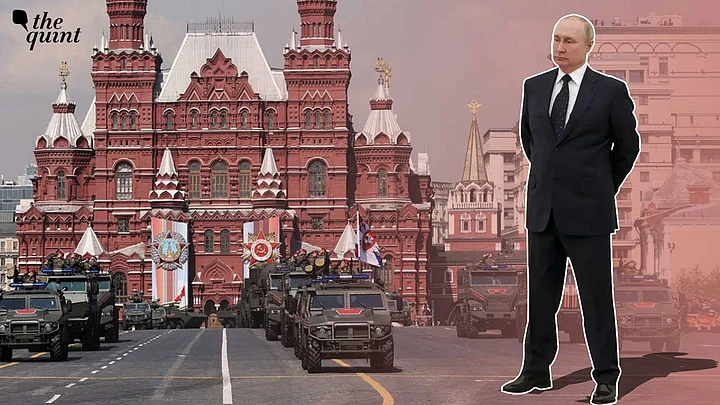It's a big day in Russia.
Russia celebrates Victory Day every year on 9 May to commemorate the triumph of the Soviet Union over Nazi Germany in the Second World War in 1945.
The date has, for decades, remembered the sacrifices of all those who devoted their lives to what the Russians call the "Great Patriotic War" in service of the Soviet Union.
This year, however, it is less about the past and more about the present. It is less about the veterans of 1945 and more about the war in Ukraine, being waged by Russia since its invasion on 24 February.
As the war rages on, Russian President Vladimir Putin on Sunday, 8 May, ahead of the celebrations, said, "Today, our soldiers, as their ancestors, are fighting side by side to liberate their native land from the Nazi filth with the confidence that, as in 1945, victory will be ours."
Many are expecting a dramatic announcement from Putin on Victory Day, which could either be a declaration of victory in Ukraine or a change of plans that could lead to further escalation in the war.
What is Victory Day?
On 22 June 1941, the military forces of Nazi Germany began their invasion of the Soviet Union, codenamed Operation Barbarossa.
Joseph Stalin was not ready for an onslaught given that the Nazis and the Soviets had signed a non-aggression agreement in 1939 that had led them to carve up Poland amongst themselves, just a few days before Hitler invaded Poland. Trade was booming between Nazi Germany and the Soviet Union as well.
Hitler did not care and Nazis went to invade the Soviet Union. "June 22, 1941 is the 9/11 of Russian history," Professor Elizabeth Wood of the Massachusetts Institute of Technology told Al Jazeera.
By 1943, the Germans lost momentum thanks to the brutal Russian winter, the unyielding Soviet military, and the ferocious resistance from the rebels in the Soviet areas occupied by the Nazis. When Stalingrad was won by the Soviets, the tides turned against Hitler's army.
By the month of May 1945, Berlin had been conquered. The commander of the German forces surrendered to the Soviets on 8 May 1945, but due to the time difference between Berlin and Moscow, Victory Day is commemorated on 9 May.
Significance and Incorporation in the Ukraine War
Victory Day was first celebrated in 1965 under Soviet leader Leonid Brezhnev, who fought in the Second World War himself.
It is, however, Vladimir Putin, who has really made 9 May a crucial part of Russian identity since 2008, making it an annual event displaying Russia's military prowess.
When Putin became president on 7 May 2000, and Victory Day was celebrated only two days later.
He asserted the significance of that day by saying: "Through you, we got used to being winners. This entered our blood. It was not just responsible for military victories, but will also help our generation in peaceful times, help us to build a strong and flourishing country."
Twenty-two years on, Putin is evoking the same sentiment, with an emphasis on Nazism.
Russia has repeatedly asserted that its "special military operation" is aimed at the "de-Nazification" of Ukraine.
"Sadly, today, Nazism is rearing its head once more. Today, it is our common duty to prevent the rebirth of Nazism which caused so much suffering to the peoples of different countries," Putin said in his speech on 8 May.
The evidence to support Putin's claims of Nazism is minimal. Nevertheless, because of how he has connected the Soviet victory in 1945 to the present war in Ukraine, observers are expecting an announcement from Putin of some kind of a symbolic victory.
This Victory Day's parade, according to Jack Detsch, Pentagon and national security reporter for Foreign Policy, is also "an opportunity for Putin to make a defiant stand in the face of all the pressure that's come from the west. And the parade is basically the Kremlin's way of saying to the United States and NATO that despite these billions of dollars in bombs, rockets and bullets and despite these bruising sanctions, that you can't hold Russia down, and calling a pariah state a pariah state is not going to make a difference here," reported NPR.
Speculations Regarding Mariupol & Further Escalation
At the heart of Russia's potential declaration of victory is the port city of Mariupol.
Ukrainian intelligence has already claimed that Russia is making preparation to organise a part of its Victory Day parade in Mariupol.
The defence intelligence agency had said in a statement, "Mariupol, according to (Russia's) plans, should become the centre of 'celebrations'. For this purpose, the city is urgently cleaning the central streets from rubble, bodies of dead and unexploded Russian ammunition."
Additionally, Sergei Kiriyenko, Putin's deputy chief of staff, recently unveiled a statue that depicted an elderly Ukrainian woman, which is now being used by Russian state media to propagate Ukrainian support for Russian troops.
Some Ukrainian resistance remains inside the Azovstal Steel Plant but Putin has already announced the 'liberation' of Mariupol.
Observers and analysts also say that there could be an escalation of Russian aggression in Ukraine.
The Kremlin has escalated its warnings of escalation in response to relentless military aid being provided by to Ukraine by the West.
Last week, the Russian forces carried out drills that simulated a tactical nuclear strike in Kaliningrad.
"There could also be provocations in Mariupol, the besieged city where just a few hundred people are holding out at the Azovstal steel factory, potentially parades there with some of the captured Ukrainian prisoners as well – so a lot of options potentially for Russia to either escalate the conflict or to make things tough on the West and kind of beat their chest in the face of a serious Western assault of sanctions and more weapons coming in," Detsch added during his interview with NPR.
(At The Quint, we question everything. Play an active role in shaping our journalism by becoming a member today.)
